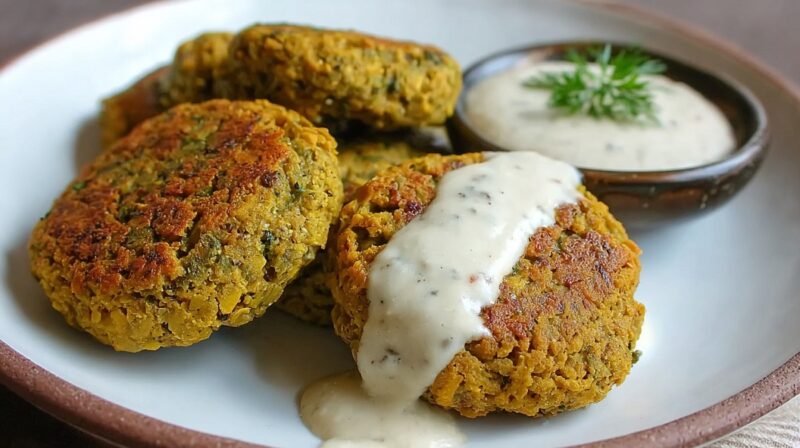Baked Falafel with Tahini Sauce (No Frying Needed)
If you’ve ever tasted a really good falafel, you know how special it is. The crispy outside, the herb-packed, tender center, and that bold, earthy flavor, it’s one of those dishes that feels deeply satisfying and nourishing at the same time.
Over the years, as a personal chef, I’ve made countless versions of falafel for clients, always tweaking to match their preferences, dietary needs, and time constraints. This baked version is one of my personal favorites, and it’s quickly become a client favorite too.
What makes it special? You get all the goodness of traditional falafel without frying. That means less mess, less oil, and more time to enjoy your food. The secret lies in the ingredients and the method.
With just a bit of prep and the right balance of herbs and spices, you’ll have golden, crispy falafel that’s just as satisfying as anything you’d get from a street vendor.
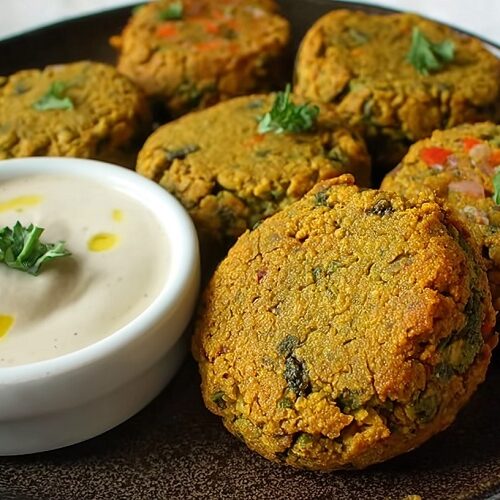
Recipe for Baked Falafel with Tahini Sauce
Equipment
- Food processor
- Baking sheet
- Parchment paper
- Mixing bowls
- Whisk
- Measuring cups and spoons
- Brush or oil spray bottle
- Air fryer (for reheating)
Ingredients
For the Falafel:
- 1 1/2 cups dried chickpeas soaked overnight, not canned
- 1 small yellow onion roughly chopped
- 3 garlic cloves
- 1 cup fresh parsley packed
- 1/2 cup fresh cilantro packed
- 1 teaspoon ground cumin
- 1 teaspoon ground coriander
- 1/2 teaspoon baking powder
- 1/2 teaspoon smoked paprika optional
- 1/4 teaspoon cayenne pepper optional
- 1 teaspoon salt
- 1/2 teaspoon black pepper
- 2 tablespoons olive oil for brushing or misting
For the Tahini Sauce:
- 1/2 cup tahini
- 2 tablespoons lemon juice
- 1 garlic clove finely grated
- 1/4 teaspoon salt
- 1/3 cup cold water adjust for consistency
Instructions
- Soak dried chickpeas in a bowl of water for at least 12 hours. Drain and pat dry before using.
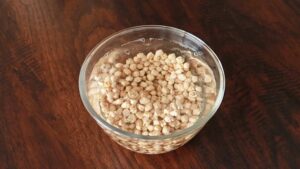
- Preheat oven to 400°F (200°C) and line a baking sheet with parchment paper.

- In a food processor, combine soaked chickpeas, onion, garlic, parsley, cilantro, and all spices. Pulse until finely chopped and uniform. The mixture should hold together when pressed.
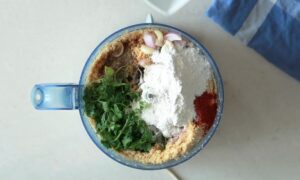
- Scoop about 2 tablespoons of the mixture and form into balls or small patties. Place on the baking sheet.
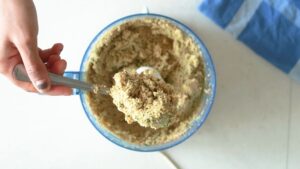
- Lightly brush or mist with olive oil for a crisp finish.
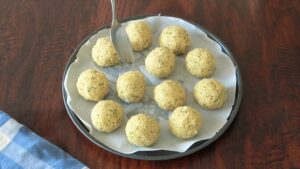
- Bake for 25–30 minutes, flipping halfway through, until golden and firm.

- While the falafel bakes, whisk tahini, lemon juice, garlic, salt, and water until smooth and creamy.
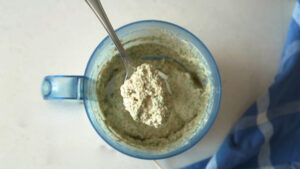
- Serve falafel warm with tahini sauce. Enjoy in wraps, bowls, or on their own.
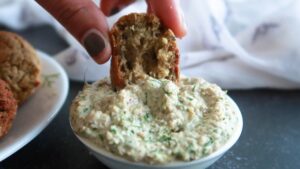
Video
Notes
- Only use dried chickpeas that have been soaked—canned chickpeas will result in a mushy texture.
- If your falafel mixture feels too wet, pulse in 1–2 tablespoons of chickpea flour or oats.
- For extra crispness, place falafel under the broiler for the last 2 minutes of baking.
- You can prepare the falafel mixture a day ahead and refrigerate before baking.
- Add-ins like grated carrot or chopped spinach can enhance color and nutrition.
Why do I bake falafel instead of frying?
I’ve spent a lot of time in kitchens, both professional and home, and if there’s one thing I’ve learned, it’s that people love simplicity. Frying can be intimidating. It’s messy, it uses a lot of oil, and unless you have a commercial-grade vent hood, your kitchen can end up smelling like a deep fryer for days.
Baking falafel solves all of that. With a hot oven and a light brush of olive oil, you still get a beautifully golden crust. It’s crispy on the outside, tender on the inside, and you can walk away while it bakes. That’s a win in my book.
The most important tip: Use dried chickpeas
If there’s one thing you take from this post, let it be this: don’t use canned chickpeas for falafel. They’re great for hummus, but for falafel, you need the texture and firmness that only dried chickpeas provide. Soak them overnight and you’re ready to go.
It might seem like a hassle, but trust me, it makes all the difference in the final result. The mixture holds together better, crisps up beautifully, and tastes the way real falafel should.
How to serve falafel
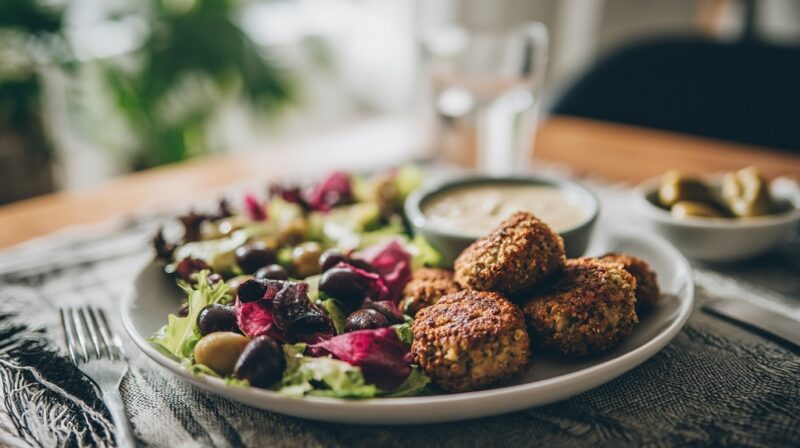
There are so many ways to enjoy falafel, and that’s part of what makes it so versatile. You can stuff them into a warm pita with fresh vegetables and a drizzle of tahini sauce, layer them into a grain bowl with roasted veggies, or serve them alongside a simple salad with some pickles and olives on the side.
Sometimes I even eat them straight off the baking sheet with a spoonful of tahini sauce when I’m in a hurry.
If you’re meal prepping, baked falafel is a fantastic option. It stores well in the fridge for up to five days and freezes beautifully. Just reheat in the oven or air fryer until warmed through and slightly crispy again.
The sauce that brings it all together
No falafel is complete without a good tahini sauce. This one is as simple as it gets – just tahini, lemon juice, garlic, salt, and cold water to thin it out. Whisk it until smooth and creamy, and adjust the consistency to your liking. It’s nutty, tangy, and the perfect complement to the warm, spiced falafel.
Kid-Friendly Variation
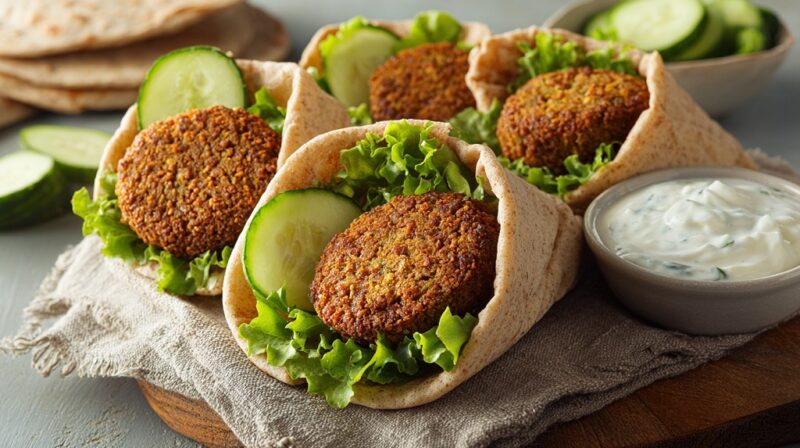
If you’re cooking for little ones, you can make this falafel recipe more approachable for younger palates. I often adjust it slightly for clients with kids to help ease them into the bold, earthy flavors.
First, go easy on the garlic and spices – skip the cayenne pepper entirely and use just a pinch of cumin and coriander instead of the full amount. You can even sneak in some finely grated carrot or sweet potato to add natural sweetness and boost nutrition without changing the texture.
Kids also tend to love foods in fun shapes, so try forming the falafel mixture into mini patties or even use cookie cutters to press them into shapes before baking.
Serve them with a milder dipping sauce – plain yogurt with a little lemon juice works beautifully – and offer them in a pita “pocket” with crunchy cucumber and soft lettuce to keep the textures fun and familiar.
It’s a great way to get kids to enjoy plant-based meals without any pressure or fuss.
A few final thoughts
What I love most about this recipe is how it brings people together. I’ve made this falafel for busy families, plant-based athletes, and curious home cooks looking to try something new.
It’s comforting and familiar, yet different enough to feel exciting. And best of all, it’s made from real, wholesome ingredients that fuel your body and satisfy your cravings.
So whether you’re new to falafel or a longtime fan, I hope this version becomes a go-to in your kitchen. Scroll down for the full recipe, and if you try it, I’d love to hear how it turns out.
Happy cooking.
Hello, my name is Marina Vlasov. Im currently trying to change my career from my current job to becoming a chef. It is a hard road, but I feel like im coming there soon. While I enjoy preparing practically all food, from various cuisines from all over the globe, I must say that I mostly enjoy preparing vegan food. That is my strongest side. That is why I want to provide you with the best vegan food recipes on this blog of mine.

